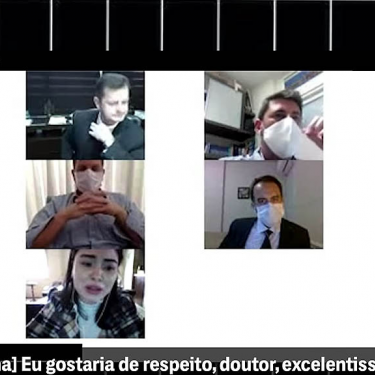Lawsuits aim to intimidate Brazilian journalists over rape trial coverage

Reporters Without Borders (RSF) condemns the defamation suits brought against two Brazilian media outlets and a reporter over a shocking story about a rape trial in which the defence lawyer verbally attacked and humiliated the alleged victim. The lawsuits, which refer to reporters as “snipers in journalists' clothing,” are intended to retaliate against investigative journalism and threaten press freedom, RSF says.
Published by The Intercept Brasil on 2 November after previously appearing on the ND+ website in September, Schirlei Alves’s story revealed severe misconduct during the trial, in which influencer Mariana Ferrer accused businessman André de Camargo Aranha of rape. In particular, the aggressiveness with which Ferrer was questioned by the defendant’s attorney – especially clear in the video footage accompanying in the report – caused an outcry. Aranha ended up being acquitted.
The prosecutor, Thiago Carriço de Oliveira, and the judge, Rudson Marcos, both brought defamation suits against Alves and the two media outlets, seeking the story’s removal from their websites and damages of 300,000 and 450,000 reais from each, respectively.
In response to the big outcry, two federal judicial oversight bodies – the National Council of Justice (CNJ) and the National Council of the Public Ministry (CNMP) – meanwhile announced investigations into the conduct of the prosecutor and judge during the hearing.
The lawyer acting for both Carriço and Marcos claims that The Intercept Brasil and ND+ deliberately published fake news. "Attacks of this nature, promoted and boosted by these media outlets, are in fact attacks directed at the judiciary, with the clear goal of demoralizing the institution,” she says. The expression “fake news” appears 60 times in her pleadings, which also label The Intercept Brasil’s reporters as “snipers in journalists' clothing.”
In a preliminary decision issued on 11 December, a local civil court judge ordered that the report be corrected in order to clarify that the prosecutor did not use the term “culpable rape” – which Alves used in her piece. The judge also ruled that the report should point out that the prosecutor intervened during Ferrer’s questioning. The Intercept Brasil and Alves could face daily fines of 1,000 reais and 200 reais, respectively, if they fail to comply with this ruling.
“It’s not the judiciary's role to correct the media by means of court-imposed text editing and, although preliminary, this decision, sets a dangerous precedent for press freedom,” said Emmanuel Colombié, RSF’s regional director for Latin America. “These lawsuits are blatant retaliation against the targeted journalists and news organizations. By documenting and revealing background information about the ordeal faced by women who survive and denounce sexual violence in Brazil, this reporter's story drew attention to a key public interest subject and complied with journalism’s mission to inform society.”
Lawsuits designed to intimidate the press are common in Brazil. In an emblematic case in 2016, 37 judges and prosecutors in the southern state of Paraná filed individual libel suits against five employees of the Gazeta do Povo newspaper after it reported that the state’s judicial officials were being paid excessively large salaries. It should be noted that because of their positions, public authorities are subject to greater scrutiny by society and the press.
Brazil is ranked 107th out of 180 countries in RSF's 2020 World Press Freedom Index.



